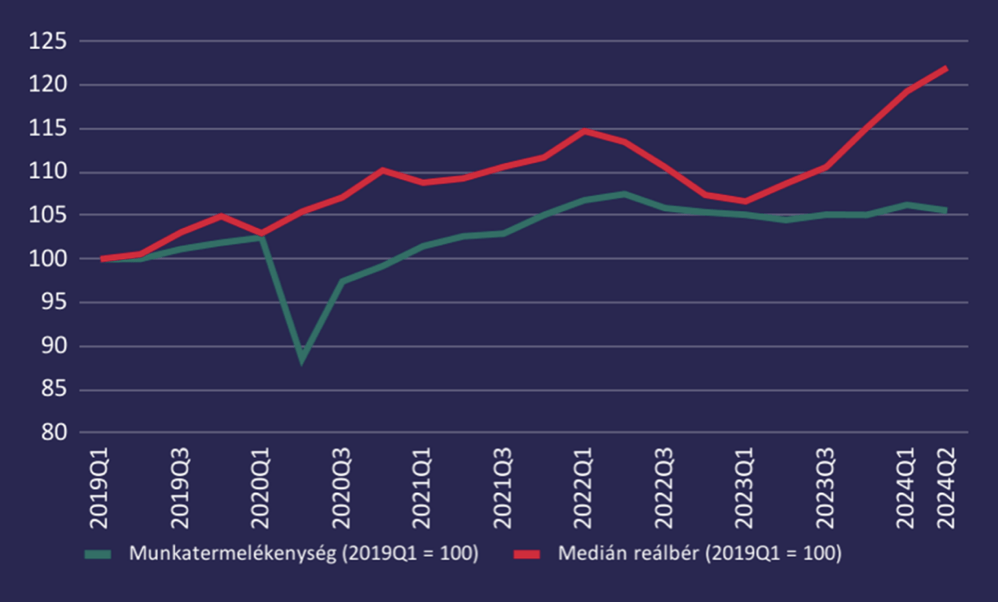VOSZ: minimum wage of 1,000 euros and an average salary of 1 million
Under the current circumstances, employers cannot generate and pay for the wage cost increase resulting from wage increases at a forced pace, which is far removed from productivity and cannot be justified by either economic growth or inflation. Achieving the planned minimum wage of EUR 1,000 and the average wage of HUF 1 million by 2028 is considered acceptable (realistic) if the enterprises receive adequate compensation (burden reduction, support), and the planned wage rates are in line with economic growth, inflation and tied to achieving productivity indicators.
Considering that the government constantly communicates its salary increase plans for the coming years, the VOSZ has also developed its position on the negotiations. Our proposals and the reasoning behind them can be summarized as follows, based on feedback from entrepreneurs:
In the last decade, the so-called “high-pressure economic policy” prevailed in our country, which meant that the wage level increased significantly more than the increase in productivity. The government’s intention and pressure resulted in wage dynamics disconnected from productivity through the forced increase of minimum wage rates.

The wage agreement cycle starting in 2017, in addition to forced wage pressure, resulted in a significant reduction of public burdens (taxes and contributions on live work): the social contribution tax was reduced from 27% to 13%, and TAO and KIVA were also reduced. All of this, in addition to the dynamically growing economic and demand conditions typical of the second half of the 2010s, resulted in a sustainable economic policy system, with increasing household, corporate and state incomes, as well as an improvement in the employment situation. This “subsidized wage competition” also contributed to the healthy evolution of businesses: new, more competitive businesses began to replace companies unable to adapt, but this did not cause mass company collapses or disruptions in employment.
Today, however, the COVID crisis and the successive energy, interest, credit, exchange rate, inflation and war crises have reduced the growth opportunities of companies, demand, consumption and productivity potential. According to KSH data, the number of social enterprises has been continuously decreasing since the end of 2022, and there are now 21,000 fewer registered companies, so on average 1,000 fewer companies are formed per month than are closed. The value of the VOSZ Barometer entrepreneur sentiment index for the 3rd quarter of 2024 decreased again, the number of companies refusing a salary increase reached an unprecedented level of 81%.
Related news
Important legislative changes: certain consumer rights now extend to SMEs
🎧 Hallgasd a cikket: Lejátszás Szünet Folytatás Leállítás Nyelv: Auto…
Read more >NGM: Hungarian micro and small enterprises can apply for site development under more flexible conditions
🎧 Hallgasd a cikket: Lejátszás Szünet Folytatás Leállítás Nyelv: Auto…
Read more >SMEs look to 2026 with positive expectations and growing confidence
🎧 Hallgasd a cikket: Lejátszás Szünet Folytatás Leállítás Nyelv: Auto…
Read more >Related news
How does the forint exchange rate affect consumer prices?
🎧 Hallgasd a cikket: Lejátszás Szünet Folytatás Leállítás Nyelv: Auto…
Read more >HELL CITY has arrived, led by Michele Morrone
🎧 Hallgasd a cikket: Lejátszás Szünet Folytatás Leállítás Nyelv: Auto…
Read more >Two million people have already voted, so 57 million forints will be given to locals in 125 settlements, courtesy of Tesco
🎧 Hallgasd a cikket: Lejátszás Szünet Folytatás Leállítás Nyelv: Auto…
Read more >








